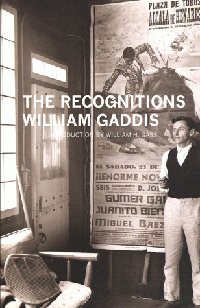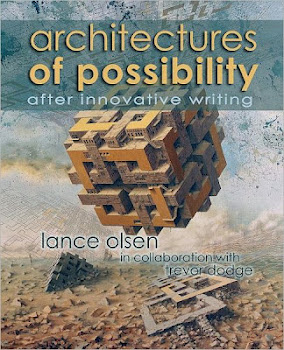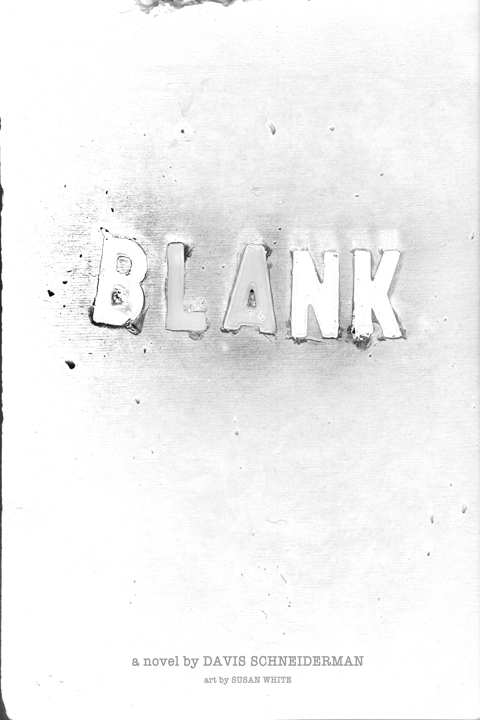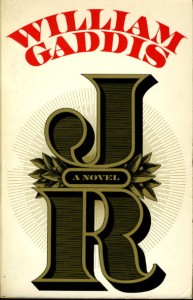Gaddis and J R: Life With, By and Before
J R
William Gaddis
Alfred A. Knopf, 1975
726 pages / $15.16 buy from Dalkey Archive or Amazon
By July I’d completed my yearlong ramble through DeLillo’s oeuvre. It was not one of the hottest summers I remember. I had a room in Crown Heights with a window that faced out to an alley, across which lived a Barbadian family, whom I was awoken by most mornings before biking the six miles, across Brooklyn, over the Manhattan Bridge, through Chinatown, to the parking lot behind the business school next to the library, where I rode the elevator to the tenth floor and worked for eight hours Monday to Friday. I had little idea or direction of what to do next.
I read Wittgenstein’s Mistress in about two sittings, during which I came to vaguely understand the significance of the name William Gaddis. All I knew when I dropped down to the eighth floor one afternoon to pick up the massive copy of The Recognitions was that it included a character who wore a clock as a necklace. The image appeared throughout Markson’s insane novel and recalled Flavor Flav, the refurbished and culturally derided figure of the preceding decade, which seemed enough for me.
It took me three attempts to get through the first ten pages. I’d decided with a friend that we would tackle it simultaneously, but he gave up a quarter way through the first chapter. He explained that he didn’t have any interest in dedicating his respite to a man baptized by Jonathan Franzen as “Mr. Difficult.” As a matter of contention or cultural superiority, or, more likely, personal superiority, I committed to reading the novel to completion and full understanding.
I did so, along the way reveling in what I referred to as the most conscious and hilarious diatribe on art ever penned. I was indoctrinated; by what I read, I found myself deeply shaken and moved.
A month passed. I signed a lease on an apartment with my girlfriend in a neighborhood that used to be a part of Flatbush but is now called Prospect-Lefferts Gardens and enrolled in my penultimate semester of college. I reread Hamlet and Heart of Darkness and The Waste Land. I read for the first time A Portrait of the Artist as a Young Man and Ulysses and “Ulysses” and “Prufrock” and Castle Rackrent. I had few conversations about Gaddis. I went out constantly for a few weeks and stopped. There was the hurricane and I walked across the Manhattan Bridge through a city without electricity to Madison Square Garden. I read Ben Gocker’s absurdly funny Content publication The Pisces on a bus from Philadelphia on three hours of sleep. I felt tired of writing. The insanity of the world seemed more sane. I was bored, watched hours of television. I still do. I’m still bored. And I thought, I think about The Recognitions regularly as this masterpiece of social and artistic criticism, the most effort ever poured into something’s message, which stands to say: It’s not worth it.
January 16th, 2013 / 1:11 pm
HIS STACK OF PALIMPSESTS
on reviewing Gaddis’s The Recognitions1
 The Recognitions
The Recognitions
by William Gaddis
Reissued by Dalkey Archive, 2012
976 pages / $18.95 Buy from Dalkey Archive or Amazon
(Download PDF Version of Review)
| “Of course I like music, but not just to listen to.” – The Recognitions (940) There is, it seems to us, “On the surface! But how much deeper do people go?” |
[1] Throughout this review I will be using quotes from the novel in footnotes to support notes I make. |
| The occasion for this review of The Recognitions, a classic American novel first printed in 1955, is its recent reissue from Dalkey Archive, with an introduction by William Gass. If I were to write a brief synopsis of the plot and major themes of the novel it would be as follows.[2] Now that we have synopsis in hand, let me speak of how that only begins to explain the more substantial elements of The Recognitions, the ones that stick: that it is concerned with originality, reality, and perfection and that these things are often interchangeable; that its characters are all involved in some type of forgery;[3] that we are just layers and accumulations and fragments within the whole, tottering in the field between familiarity and recognition; that art and religion have similar strands and weights of guilt, combatant with truth; and so on. Because of the novel’s size—956 pages—I will stick with the aforementioned elements, with the belief that they get us readers thinking and moving the most; additionally, I will leave Gaddis out of this review— READ MORE > |
December 10th, 2012 / 12:00 pm
Q & A WITH TODD GRIMSON
Todd Grimson is one of the great living cult novelists. I’ve known him for a few years, under strange circumstances. He wrote Brand New Cherry Flavor, which is both one of my favorite horror novels and my favorite novel about Hollywood and the film industry. He also wrote the underground vampire classic Stainless. Both were recently re-released by Schaffner Press, which is now publishing his new collection of stories, Stabs at Happiness, in pleasing hardcover.
It’s a terrific collection, diverse and weird and disturbing. (Here are some reviews: Litbitch. The Oregonian. Gothic.net.) You can and should buy it.
I asked Todd some questions about Stabs at Happiness and about his strange life and career.
For a while, you assumed the name “I. Fontana” and published stories in BOMB, Juked, The Quarterly, Lamination Colony, Word Riot, PANK, the Voice Literary Supplement, Bikini Girl, Spork and many others. We corresponded for some time before I knew your real name. Why did you adopt that name?
Fontana comes from “Fontana Mix,” a composition by John Cage I heard when I was 13. READ MORE >
Intro to the Avant-Garde: A Secondary Materials Primer
Or, a recommended reading list for those who wonder where to begin.
As with any field of study, entry points abound.
With that in mind, my objective here is not to be comprehensive but rather to suggest a limited set of key texts that should help readers familiarize themselves broadly with the critical conversation surrounding the historical Avant-Garde. In the interest of symmetry, I offer ten books and ten articles, with a few supplements along the way.
One of the inherent problems of studying the Avant-Garde is its interdisciplinary nature, which could make it seem overwhelming given the vastness of its reach: far beyond typical artistic areas. Cecilia Novero’s recent book Antidiets of the Avant-Garde: From Futurist Cooking to Eat Art, and Alastair Brotchie’s A Book of Surrealist Games
are prime examples. Also, the overlap with Modernism makes any conversation about the A-G seemingly inseparable from a conversation about Modernism, which brings a whole host of other issues to the table. Don’t let either obstacle hamper you. For the sake of focus, I have limited my suggestions to texts that specifically address the A-G in its general (leaning toward literary) sense, which means I omitted a few really great books that focus specifically on, say, music, or that focus primarily on Modernism.
Oh, one last thing…keep in mind, what follows is a list of secondary materials: writing about the Avant-Garde. In the not-too-distant-future, I intend to produce a companion list of primary materials: writing from the Avant-Garde.
Since it’s likely I left out your favorite book on this subject, additions to the list are welcome in the comment minefield.
Architectures of Possibility: An Interview with Lance Olsen
Lance Olsen is the author of more than 20 books of and about innovative fiction. He acts as Chair of the Board of Directors for the Fiction Collective 2 and teaches experimental narrative theory and practice at the University of Utah. What follows is a conversation with him about his newest book, Architectures of Possibility: After Innovative Writing.

Q: Would you talk a bit about the book in relation to its title? Why the words “architectures” and “possibility”? What about the phrase “after innovative writing?” Are we now in a post-innovative literary world?
A: Let me take your last two questions first, and argue that the history of writing (think Petronius’ Satyricon, Sterne’s Tristram Shandy, Joyce’s Ulysses) has been, not one of dogging conventions, but of continuously undoing them, experimenting with and beyond them, continuously redefining them, exploring the boundaries of the writerly act, of how we might tell our narratives—and hence ourselves, our worlds—differently. So-called conventional acts of writing, then, are the uninteresting detritus of literary history. Innovation is where literary history takes place.
If that’s the case, then contemporary experimentalists are not only continuously in pursuit of the innovative, but are also always-already writing subsequent to it—writing, that is, in its long wake. Hence my pun in the title on the word after.
And so to your initial question: for me, innovative writing represents a possibility space where everything can and should be attempted, challenged, thought, where every architecture should be explored. In other words, we’re talking about the ideology of form here. Another way of saying this: meaning suggests meaning, but structure suggests meaning as well. To structure one way rather than another is to convey, not simply aesthetic preference, a matter of taste, but a course of thinking, a way of being in the world, that privileges one approach to “reality” over another. One of the jobs of the innovative is unceasingly to challenge the dominant cultures’ narrativization of “reality,” to remind us that there are always other ways to construct the text of our texts, the texts of our lives, always the possibility of effecting change in both.
To write within the innovative, then, is much more than a creative choice. It’s an ethical imperative.
What is Experimental Literature? {Five Questions: Michael Martone} ***NOTE: final entry in the series***

Michael Martone‘s most recent books are Not Normal, Illinois: Peculiar Fiction from the Flyover, Racing in Place: Collages, Fragments, Postcards, Ruins, a collection of essays, and Double-wide, his collected early stories. Michael Martone, a memoir in contributor’s notes, Unconventions, Writing on Writing, and Rules of Thumb, edited with Susan Neville, were all published recently. He is also the author of The Blue Guide to Indiana, published by FC2. The University of Georgia Press published his book of essays, The Flatness and Other Landscapes, winner of the AWP Award for Nonfiction, in 2000.
POP: A Polemic on a Contemporary Language-Based “Objectivity”
 I do not like metaphor. My personal education pertaining to literature takes a very French bent, and it is here that Robbe-Grillet himself, king of the nouveau roman one could say, has denounced metaphor, preferring, I suppose, some sort of metonymy, but–if anything–participating in the creation of a style of fiction in which the surface is more important than a subtext.
I do not like metaphor. My personal education pertaining to literature takes a very French bent, and it is here that Robbe-Grillet himself, king of the nouveau roman one could say, has denounced metaphor, preferring, I suppose, some sort of metonymy, but–if anything–participating in the creation of a style of fiction in which the surface is more important than a subtext.
I think that this adherence to the surface, at least in terms of language, is good, positive, because it removes an additional level of signification, which brings us, as a reader, closer to the experience the language itself is hiding, carrying, revealing. Though often, in the creation of atmosphere, metaphor can be adequately used to help evoke a mood, I feel like there are often more interesting ways to do this (and I suppose that here, by “interesting,” I mean “heterogeneous, diverse, wildly more creative”).
READ MORE >
Playing catch up with the stacks
All around my desk, stacks of texts pile up until Beatrice (our mackerel tabby) knocks them down. Then I try to re-stack them. One stack should be material for review, one stack for fun, one stack for research projects, etc. This always never works. Stacks blend with other stacks to form new stacks. With my wife’s desk on the opposite wall in our study, her stacks always threaten to encroach on my stacks, our individual stacks blending to make ever more new mutant stacks. Our bookshelves are brimmed with books: no room remains anywhere there. I’d take a picture to show you the absurdity of it, but probably many of you have similarly absurd looking book situations.
At any rate, one of the stacks is stuff I’ve intended to write about here on htmlgiant, but for one reason or another, one prior commitment or another, I got sidetracked and failed to write about it like I should have or would have or wanted to, etc. Some of it I’ve read cover to cover, some of it I’ve taught to undergraduates, some of it I’ve still only flipped through. I’m sure some of the texts in the stack have moved to other stacks, so I’m probably gonna omit stuff, but at least here are a few of the things in that stack…
Approaching an Ideology of Art

In order to sit down and establish any sort of ideology1 that guides my life, I really have only a single point to consider: art2 is, without a doubt, what is most important to me. Out of everything. I say this without a hint of irony, with a complete presence of sincerity: everything that has ever been important to me has been mediated by art, to some degree.
Perhaps this is easy for me to say because I equate art with pleasure. Or the idea that art is beauty (as a definition from dictionary.com would like to suggest). If this were true then I wouldn’t have anything to say here. But, the unfortunate thing is that there is a lot of bad art that makes me furrow my brow and launch into hyperbolic rhetoric or a complete insincerity (read: irony). The other negation to the aforementioned declarations heeds itself to my own ideas in an appreciation of affect over visual aesthetic: i.e., something ugly, terrifying, and evil can bring pleasure.
I am not an overly-depressed person. I am (fairly) high functioning in a pretty normal way. I have no desire to be constantly escaping from reality. Kneeling at the temple of Art is not about escapism for me, and I think that’s why I inherently hate the idea of mediating an experience of art (exclusively) through empathy (this is why I will always champion modes of art that lie outside of representation3).
I occasionally feel like when I make this declaration, I am widening a divide between myself & the general public. I say this without elitism. The problem is making a statement like this seems to establish binary opposition: if I don’t like representation, I must like crazy non-narrative abstract shit. Right? I mean, that binary presupposes the person who is contrasting her or his own approach to art with mine is able to conceive of an approach to art that is outside of representation (and this is part of why my mother has no idea in regards to what I am interested in and what I am doing when it comes to “art”).
But here’s the thing: I love narrative. I have no desire to escape narrative. Of course, throughout my experiences with art I have grown mostly tired of archetypal narrative arcs, neatly wrapped up stories, etc etc. But that’s not the point. What I look for in art, what I aim for in art, ultimately, as I’ve said many noted many times in comment threads, is affect.
Andy Devine vs. Davis Schneiderman

(Adam’s note: The other day I was rummaging around in Andy Devine’s gross apartment trying to stomp on a cockroach when I came across a box of cassettes. “What are these, Andy?” I asked. He was passed out on a crap-ass couch. “Mix tapes,” he grunted, “for old girlfriends.” I doubted that. I played one. It was a conversation with Davis Schneiderman. “What are you doing with this interview with Davis Schneiderman, Andy?” I asked. He rolled over on the couch. “Nothing, because I don’t like his cocky last comments.” So I took the tape home with me, transcribed it, and I present it to you now. It’s great. Andy really contextualized and problematizes Schneiderman’s new novel, Blank. Who better than the author of Words to ask questions in a way that points to how much content exists within a book that has no words. Roxane wrote about the book here, should you want more.)
Davis Schneiderman is a multimedia artist and writer and the author or editor of eight print and audio works, including the novels Drain (TriQuarterly/Northwestern) and Blank: a novel (Jaded Ibis), with audio from Dj Spooky; the co-edited collections Retaking the Universe: Williams S. Burroughs in the Age of Globalization (Pluto) and The Exquisite Corpse: Chance and Collaboration in Surrealism’s Parlor Game (Nebraska). His creative work has appeared in numerous publications including Fiction International, The Chicago Tribune, The Iowa Review, TriQuarterly, and Exquisite Corpse, and he is a contributor to The Nervous Breakdown and Big Other. 2010-11 appearances include the University of Notre Dame, the Ukrainian Embassy in D.C, the Chicago Cultural Center, the University of London Institute in Paris, and The New School, among others. He is Chair of the English Department at Lake Forest College, and also Director of Lake Forest College Press/&NOW Books. He edits The &NOW AWARDS: The Best Innovative Writing.
Andy Devine: How did you decide between BLANK and, say, BLANKS or something entirely different for the title?
Davis Schneiderman: I’ve always been fascinated by the titles of musical works, particularly mid-twentieth century jazz compositions. I think how different a work such as Charles Mingus’ “Orange Was the Color of Her Dress, Then Blue Silk” would be if it were called “Untitled” or “Round Midnight” or “Rocket Number 9 Take Off for the Planet Venus” (Sun Ra). The title of minimalist art works can also function in the same way—coding the text or painting or sculpture in a way that is different than how the title of a non-conceptual work might function. Would The Da Vinci Codes have been the same book? What about Chicken Soup for the Souls? For the most part, probably, except that the latter might have approached self-help from a pantheist perspective. READ MORE >


